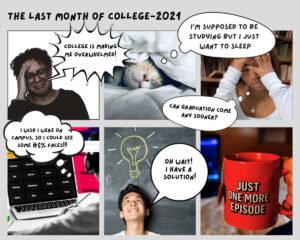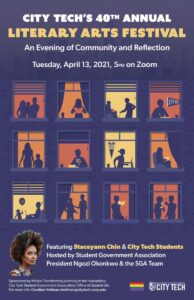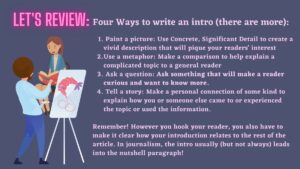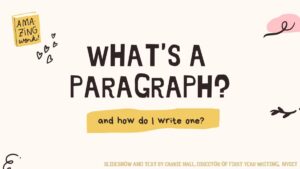For the record, after this week, I’m going to stop writing by 8 AM, but it’s always due by 8AM.
- READ for Tuesday is to pick ONE of the articles below (they’re all on Perusall) and read and annotate it. I have included (both here and on Perusall) some key quotes that may help you decide which article you want to read. Instructions are on Perusall, but please note that I’d really like us to start talking with each other in the Perusall comments this time around! Read each other’s annotations and comment on them. You can do this by commenting below, but you can also use the “@” icon and their name to ping them directly.
- WRITE: Write a blog post (at least 300 words) in which you respond to your article. What did you learn from reading this article? How did this author use research? How do they use personal experience?
You may also want to write about what made you choose this article in the first place. Did it live up to your expectations?
Category: Unit 2!!
Here is an overview of the articles (again, they are all on Perusall). The boxes contain short quotes from the articles to help you choose which one you’re most interested in:
Option 1: Vox “The Year We Gave up on Privacy” (How the Covid-19 Virus Affected Our Privacy)
As a digital privacy reporter, I try to avoid sites and services that invade my privacy, collect my data, and track my actions. Then the pandemic came, and I threw most of that out the window. You probably did, too.
Option 2: The Atlantic: “I’m Not Black I’m Kanye”
And he was destroyed. It happened right before us. God was destroyed, and we could not stop him, though we did love him, we could not stop him, because who can really stop a black god dying to be white?
Option 3: Science News: “How Coronavirus Stress May Scramble Our Brains”
Scientists recognize the pandemic as an opportunity for a massive, real-time experiment on stress. COVID-19 foisted on us a heavy mix of health, economic and social stressors. And the end date is nowhere in sight.
Option 4: The Cut: “Is Marriage Obsolete?”
Forty-five percent of all Americans 18 and older are now single, and more than half of Americans surveyed said that getting married wasn’t an important part of becoming an adult.
Option 5: Sports Illustrated: “Why I’m Behind the Athletes’ Bill of Rights”
College sports is a $14 billion industry that is significantly generated by the unpaid work of young people. While I came from a family able to support me during my college years, many athletes do not, and they struggle to meet the costs of going to school that are beyond what a scholarship covers.









Recent Comments